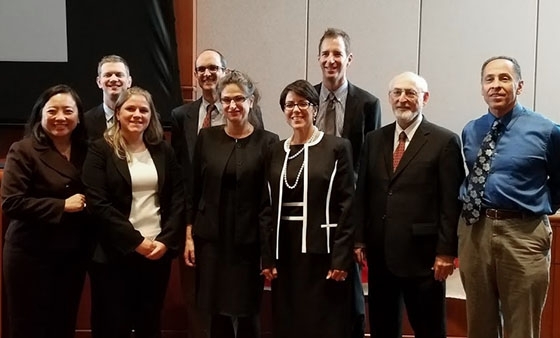
Back Row (L-R): Chad Flanders, Carlos A. Ball, Nelson Tebbe; Front Row (L-R): Elaine Chiu, Victoria Drake, Patricia Marino, Rosa Castello, Alan Brownstein, and Andrew Koppelman
Last week, leading scholars in the fields of law, religion, politics, and ethics came together at St. John’s Law for a Constitution Day symposium on “Religious Freedom Today.”
Hosted by the Journal of Civil Rights and Economic Development with the Ronald H. Brown Center for Civil Rights and the Center for Law and Religion, the event presented a discussion of Religious Freedom in an Egalitarian Age (forthcoming from Harvard University Press), a book by Nelson Tebbe, a professor of law at Brooklyn Law School and a visiting professor at Cornell Law School.
In the book, Professor Tebbe sets out a new method—called social coherence— for mediating between religious freedom and equality laws that have gained recent recognition in the areas of women’s rights, gay marriage, and LGBT citizens. After he introduced his methodology to the symposium attendees, Professor Tebbe welcomed commentary from his colleagues on the panel:
- Carlos A. Ball (Rutgers School of Law-Newark)
- Alan Brownstein (UC Davis School of Law)
- Chad Flanders (Saint Louis University School of Law)
- Andrew M. Koppelman (Northwestern University School of Law)
- Patricia Marino (University of Waterloo)
Each of the panelists presented their views on one of the following points:
- The method of “social coherence,” which considers values and beliefs in a reasoned, logical, and non-arbitrary manner
- The application of the method of “social coherence” for the purpose of avoiding harm to others through public accommodations law in a manner that does not defeat the purpose of the law and to promote three objectives: (a) economic opportunity, (b) expressive harm avoidance, and (c) government exclusion
- Freedom of association (private v. public) and employment law (retaliation) such as the ministerial exception.
“It was very interesting to observe the critique of Professor Tebbe’s work in this open forum,” says journal staff member Joshua Soares ’18. “We saw legal scholarship advanced between leading academics, along with an application of new legal arguments to an issue that can be fraught with tension.”
Victoria Drake ‘17, the journal’s editor-in-chief, agrees that the event offered St. John’s Law students a unique learning opportunity. “The event exposed us to a conversation on religious freedom that goes beyond what we typically learn in the classroom,” she notes. “As future practitioners, it’s important for students to understand how the law impacts the beliefs and lives of people everywhere. This symposium gave us that critical perspective.”
The symposium proceedings will be published in a future issue of the Journal of Civil Rights and Economic Development.
The student-run publication launched in 1985 as the Journal of Legal Commentary. Its name was changed in 2010 to better reflect the journal’s mission and content. Throughout its history, the journal has offered a vital forum for illuminating and discussing vital issues of the day, including child advocacy, criminal justice, race and the law, national security, and law and religion.
Guiding the journal as faculty advisors are Professor Elaine M. Chiu, who directs the Ron Brown Center, and Professor Rosa Castello ’06, the center’s assistant director. In addition to working on the publication, journal members participate in the affiliated Perspectives on Justice course taught by Professors Chiu and Castello. There, they have an opportunity to write notes, blog posts, and op-ed pieces on topics of social justice.
“The Journal of Civil Rights and Economic Development has always been, and will continue to be, a resource for exploring issues that impact our society and its citizens deeply,” says Professor Chiu. “Our Constitution Day symposium on religious freedom reflects that core commitment to providing an open and ongoing conversation about freedom, civil rights, equality, and social justice, among other topics that go to the heart of our identity as individuals, as communities, and as nations.”
